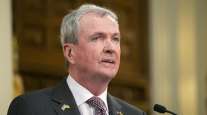Staff Reporter
New Jersey Gov. Phil Murphy Signs Electric Vehicle Law

[Stay on top of transportation news: Get TTNews in your inbox.]
New Jersey Gov. Phil Murphy signed legislation Jan. 17 to support electric vehicle use and charging infrastructure in the state.
The legislation advances an initiative to create infrastructure for a statewide charging network. Charging stations would be installed along certain travel corridors and in community locations, such as town centers or commercial areas.
One purpose of the charging network is to reduce “range anxiety” — a concern among drivers that charging stations may be so scarce that they will find themselves stranded with a drained battery.
At a signing ceremony, lawmakers said that EVs are becoming increasingly common and acknowledged their environmental and operational cost benefits.
Governor Murphy Signs Bill Establishing Goals and Incentives for Increased Use of Electric Vehicles https://t.co/L9ZKW04nMS — Governor Phil Murphy (@GovMurphy) January 17, 2020
“When we talk about climate change, you can’t talk about that without talking about transportation,” said Rep. Daniel Benson (D-Hamilton), one of the legislation’s primary sponsors. “This is the way we get to that cleaner future.”
The law establishes an Electric Vehicle Working Group within the Department of Environmental Protection. Made up of government officials, a port executive and utilities and EV experts, the group will create a comprehensive Statewide Vehicle Charging Infrastructure Plan.
Within 180 days of organization, the working group will determine which travel corridors should be included in the charging network. They also would study opportunities to expand EV programs for heavy- and medium-duty trucks and drayage equipment.
In order to encourage the purchase of such vehicles, the legislation establishes a rebate program geared toward light-duty plug-in EVs. The rebates will provide up to $5,000 per vehicle and will be supported by about $30 million from the state’s Clean Energy Fund each year. The public education program about the rebates will involve vehicle dealerships and manufacturers.
Several goals formalized in the legislation indicate that New Jersey is anticipating more electrification in the future. One goal is that, by Dec. 31, 2025, at least 330,000 of the registered light-duty vehicles in the state will be plug-in EVs. Other goals aim to have charging equipment installed at residential properties and workplaces.
The legislation takes into account the future electrification of heavier vehicles as well. It calls for the establishment of benchmarks for electrification and infrastructure development to address medium- and heavy-duty diesel vehicles by Dec. 31.
According to the Sierra Club, a national environmental organization, transportation makes up almost 50% of greenhouse gas emissions in New Jersey.
“The passage of this landmark EV legislation will protect the climate, save lives, lower costs for families and businesses and create jobs for communities across New Jersey,” said Jeff Tittel, director of the Sierra Club’s New Jersey chapter. “We applaud the Legislature for giving the green light for our state to charge forward with proven policies to accelerate electric vehicle adoption.”
By the end of 2020, at least 10% of the new bus purchases made by the New Jersey Transit Corporation will be plug-in EVs, according to the law. Doug O’Malley, director of Environment New Jersey, said this legislation will place New Jersey Transit on par with the more than 60 transit agencies across the country that have committed to electrifying their bus fleets. Environment New Jersey is part of the Environment America advocacy federation.
Our director @DougOMalleyENJ introduces @GovMurphy to sign the electric vehicle bill. New Jersey is a national leader in climate action! #EVs4NJ #ElectrifyNJ — Environment New Jersey (@EnvironmentNJ) January 17, 2020
“To meet our obligations in combating global warming, we need to aggressively ramp up electrification of our entire transportation system, and this bill does just that,” O’Malley said. “Electric vehicles are our best way to tackle the climate crisis and reduce air pollution.”
The Department of Environmental Protection is charged with submitting a report on the state of the EV market and progress toward achieving these goals to the governor by Dec. 31, and every five years thereafter.
Want more news? Listen to today's daily briefing:




